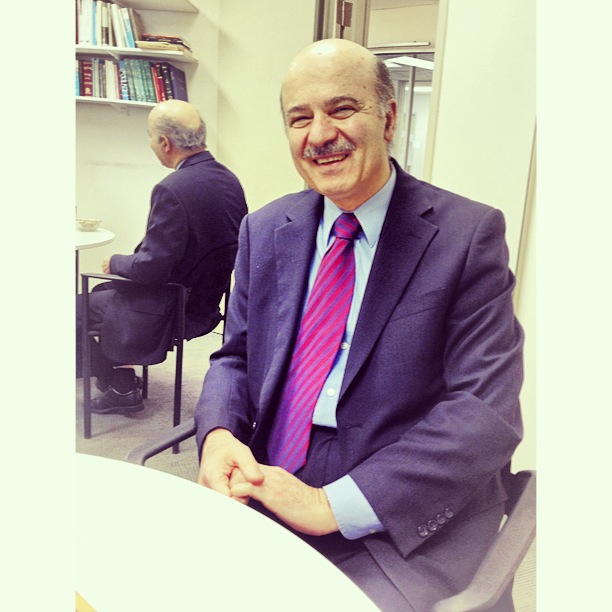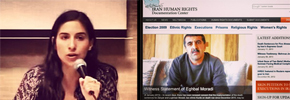Moridi Backs Wynne
Sima Sahar Zerehi – History was made on January 26th. Kathleen Wynne was elected as the Liberal party’s leader and became the first female Premier of Ontario, and the first openly lesbian leader in Canada. Standing right by her side throughout the convention at Mattamy Athletic Centre, the former Maple Leaf Gardens, was MPP Reza Moridi, another trailblazer, the first Iranian-Canadian to be elected into office in Canada.
It was a historic day, with tens of thousands of labour and anti-poverty activists rallying outside the convention centre, while thousands of Liberal party members contemplated who was fit to re-vitalize the party’s brand and repair the fissures at the Ontario parliament so that the province could get back on track.
By the time the votes were finally announced a few excruciating hours later than promised, the outcome was all but a formality. Barring some miracle in accounting Kathleen Wynne was the woman of the night.
Throughout the weekend, one by one Wynne’s opponents had crossed the floor, some in well-orchestrated timely gestures, others fumbling and missing their cue and failing to make any real impact. But for most members of the Iranian-Canadian community, the person to watch was Richmond Hill MPP Reza Moridi, a dignified professorial looking middle-aged man standing resolutely by Wynne’s side throughout the entire hullabaloo.
While the media hummed and hawed about whether the Liberals or the people of Ontario were ready for an openly lesbian woman to lead the party and the province, Moridi quietly showed all who were watching that Iranian-Canadians were passed such discriminations. He was standing by Kathleen, and he knew that his constituents would respect his allegiance.
It might seem strange for some to see a middle-aged man from Iran backing a candidate such as Wynne for a leader, but that’s because they don’t know Reza Moridi.
From Science to Politics
Although Moridi has made a few questionable choices in his life, namely moving from the tropical paradise of Fiji to Canada, when it comes to politics his instincts have served him well.
After graduating with a PhD in physics from UK’s Brunel University, Moridi spent years establishing himself as a scientist and academic, and business leader.
Speaking of his journey to Canada Moridi recounts, “In 1990 I left my job as a professor at the University of South Pacific in Fiji and arrived in Canada with my wife, two children and four suitcases.”
Armed with a top-notch education and a distinguished career as a scientist and academic Moridi was one of the rare immigrants who had no difficulty finding work in his field.
After moving to Canada he accepted a position a scientist at the Radiation Safety Institute of Canada. Subsequently, he was promoted to the position of Director of Science and Technology and then to the position of Vice-President and Chief Scientist of the Institute.
Moridi was presented with numerous accolades throughout his career including being elected as Fellow of the UK Institute of Physics in 1986, and Fellow of the UK Institution of Engineering and Technology in 1992, being awarded by the Canadian Nuclear Society for his research in the nuclear field in 2001, and presented with the Fellow Award by the US Health Physics Society in 2002.
Despite his success as a scientist Moridi admits that he always felt a call towards public service. “I have always had a passion for community work and activism, even as a student at Tehran University I was active in a student association, which was uncommon at the time, and organized events and raised funds to assist economically challenged students.”
How the Candidate Became the MPP
Finally in 2006, Moridi made a shrewdly timed decision to run for a position as a provincial Liberal candidate in Richmond Hill. This was not the first time Moridi had been encouraged by friends and fellow Liberal party members to seek a nomination as candidate for the provincial party but this time Moridi felt that the community was not only eager but also ready for the challenges of seeking a political position within the party.
After meditating on the issue, Moridi sought the advice of his chief advisor, his wife, “I told her, if you agree, I will run.” She agreed.
Moridi notes that despite the fact that he had been active in the Ontario Liberal party for a few years, he still had a great deal to learn about the process of seeking the nomination as the Party’s candidate in the riding.
He explains, “They told me the rules of the game. Once the party approves you informally as a candidate they open nominations to other possible candidates. You start signing people up for membership in the party and so do your opponents. Eventually the party calls an annual general meeting in the riding and all members in the riding are invited to vote for their candidate of choice, the person who wins becomes the candidate for the party in the riding.”
Smiling Moridi admits, “Honestly, it’s much more difficult to get approved as a candidate than run in a general election. When you’re running for a nomination your opponents are your friends and colleagues; the competition is within the party.
You also have to sign up people for membership to the party. This isn’t an easy thing, not many people want to sign a membership card and formally affiliate themselves with a political party.”
He adds, “You need to have a certain talent and people skills.”
Realizing that his success in politics was tied to his connection to the Iranian community, Moridi began to build a base for himself among the Iranian-Canadian community in Toronto.
“I would go to wherever the community gathered, like Mel Lastman Square, Iranian grocery stores on Friday evenings when people picked up their community newspapers and shopped for the week, I would be there trying to introduce myself to people and sign up members,” explains Moridi.
“I also tried to educate people through the media,” recounts Moridi, “the Iranian media has been helpful, print, radio and television media outlets supported me and gave me opportunities to address their audiences.”
“Businesses in the community like convenience stores also allowed me to stay outside their doors and speak to their customers as they came to do their shopping,” states Moridi.
Chuckling to himself Moridi recounts how he lugged a heavy podium a carpenter friend had built him everywhere, “I used to carry this podium on my shoulder across the park for community picnics or to other community gathering.”
While Moridi concentrated his efforts primarily on the Iranian-Canadian community in those early days he also made significant efforts to approach other communities in Richmond Hill. He notes, “I also reached out to the Italian, South Asian, Filipino, and Chinese communities as well as various religious communities in the area.”
Despite his distinguished career, Moridi was not afraid to get his hands dirty. He knew that success in politics meant pounding the pavement and knocking on doors. He also realized that he needed the help of many volunteers to accomplish his goals.
“I would find the addresses of Iranians living in Richmond Hill in the phone book and go and knock on the door and ask them to become members of the party,” explains Moridi, and adds, “everyone responded positively.”
He notes that even people with connections to other political parties supported his campaign, “We had some Iranians with close connections with the NDP and PC and even they came and supported me; they supported me as a person because they believed that I would represent the community well.”
Moridi and his growing team of dedicated volunteers signed over 2,300 members in 2006-2007 for the Ontario Liberal Party becoming first among all 107 ridings in Ontario for new member recruitment.
By May 6, 2007 the day of the AGM, seeing the writing on the wall, Moridi’s opponents had bowed out of the race. Despite the fact that Moridi was to be acclaimed as the candidate for the Richmond Hill Provincial Liberal’s about 1,000 new members, predominantly the Iranian community, packed the Lion’s Hall. The crowd was so large that it spilled to the courtyard.
Moridi notes, “It was a great shock to party officials that so many people had come.
The Iranian community had showed up to see the results of their hard work.”
Despite the months of door knocking Moridi and his team’s work was far from over. “On May 6th we had the AGM and on May 7th the day after I resigned from my job and started to work on my campaign with the help of my volunteers. For 5 months I worked very hard on my campaign.”
Making History for Iranian-Canadians
Moridi says that October 10, 2007, the day of the provincial election in Ontario was “One of the highlights in my life; a dream of our community came true.”
He recounts, “The campaign managers have a tradition, they ask the candidate to stay at home on Election Day. So I was sitting at home and watching TV. Around 9pm I saw the election coverage, the victory party was organized at Shiraz restaurant, which has a huge parking lot, so many people came out that night that the parking lot was full. Over 300 people had gathered inside and even more were outside. A Toronto Star reporter was there and I said my election is what the Iranian community wanted, to give back to our country, Canada, this country had accepted us since 1979 and we felt like we had to give back.”
Official Recognition for Nowruz
Moridi’s aspirations for the community didn’t end with his election. “I had a dream to get Nowruz recognized by the Provincial legislature. This was something I was working on in 2003/2004 with Mario Racco and in 2005 with David Caplan, but it hadn’t gone anywhere. Before that in 1991 Iranians had asked MP Bill Attewell at the House of Commons to work on this but it didn’t pass.”
Explaining why it was important for him to obtain official recognition for Nowruz in Canada he responds “Nowruz is our identity; it has a very deep root in our culture, it has kept Iranian culture alive. If Nowruz is recognized it means our community is recognized, it is our ID card as an Iranian.”
Moridi recounts, “The first chance for me to bring a motion to the house in 2007 was in March to proclaim the first day of spring as Nowruz in Ontario, and the debate on the motion was in April 2008. I was very nervous knowing the history of failures associated with this issue. But when my colleagues in house spoke everyone was positive, and when it came to voting everyone shouted yes, and when they asked who is opposed, there was dead silence.”
While getting the province of Ontario to recognize Nowruz was a huge undertaking, this success only fueled Moridi’s passion for the cause.
“In 2009 I said ok we have to do it on the federal level now. I talked to Michael Ignatieff, then Leader of the Liberal Party of Canada, and sent him information. Bryon Wilfert, made the motion. I wanted this to happen on March 22. Initially the PCs said they weren’t going to vote for it, at the time we had minority government and couldn’t get things done without the PC assistance and it took about a week to make a deal with them. Finally on March 29 the motion passed and Nowruz became official in Canada,” recalls Moridi.
What began as a motion in Ontario, gained national recognition in Canada, a year later UNESCO (United Nations Educational, Scientific and Cultural Organization) also passed a resolution recognizing Nowruz, which was followed by a resolution passed by the US Congress.
Human Rights Work
While Moridi is most proud of putting Nowruz on the map of Canadian and international politics he has also spearheaded a number of other causes during his time in the legislature including raising the profile of human rights issues in Iran particularly following the 2009 fraudulent election.
In the summer of 2009 Moridi was a regular fixture at the almost weekly demonstrations and gatherings designed to draw attention to the pro-democracy movement in Iran. He spoke at hundreds of events, rallies, panels, marches and conferences about the importance of this youth-led movement and worked tirelessly to gain Canadian support for the activists on the ground.
Moridi has also been an advocate for many individuals languishing in Iranian-jails such as Iranian-Canadian Saeed Malekpour and prominent human rights lawyer Nasrin Sotoudeh to name a few.
In addition, he has worked in partnership with various ethnic and religious groups on human rights issues that impact their communities such as the Baha’i community, the Kurdish community, and the Azerbaijani community.
Moridi in Richmond Hill
While Moridi has always kept an eye on international issues, particularly in relation to Iran and Iranian-Canadians, he was also worked diligently on bettering the local Richmond Hill community.
His work has included the redevelopment of the Mackenzie Richmond Hill Hospital and the upcoming Mackenzie Vaughan Hospital; monumental projects that will guarantee radically improved access to health care for the growing populations in the area.
In 2012 Moridi also took up the challenge of addressing the undemocratic structure within the Municipalities in York Region, by bringing forward a bill that would make the Chair of the Municipality be elected rather than appointed.
“I felt there was a deficiency of democracy in York Region,” explains Moridi, “York is a growing municipality with a population of 1.1 milion people, it’s a mega city in itself with a budget of $2.8 billion, and the person who acts as Chair and CEO of the region is practically a mayor.”
By bringing forward a bill to modify the municipal act, Moridi asked to make this position an elected position. The Bill passed first and second reading with support by all parties but with the prorogation of the legislature it was unable to advance any further, Moridi is determined to reintroduce it once MPPs return to work.
Staying Connected to his Roots
By any measure Moridi is a highly accomplished individual in both his careers as an academic as well as a politician. But when you ask him the secret to his success he doesn’t talk about his education or his professional skills, instead he points to the people from the Iranian-community who have supported him.
“I’m so grateful to my own community, when I was knocking on doors as an aspiring candidate for the party any Iranian door I knocked on would welcome me. With the Iranian community there was no, no. I recall one person said put ten signs on my lawn. The Iranian households would always offer my team and I sweets and refreshments. They really showed their support,” explains Moridi.
Smiling broadly Moridi recalls one of his favorite election stories, “I remember in 2007 a family came to me, they were anxious because they had to go to Iran to visit a terminally ill brother. Despite their personal issues they wanted to see me because they were worried about missing the election and wanted to know if they could vote at the Canadian embassy in Iran. Later I heard from them that they hired a car service in Tehran and paid a significant amount of money to be taken to the Canadian embassy to cast their vote for me.”
“At least 1,000 Iranians helped me as volunteers and financial supporters in my campaigns,” notes Moridi. “Iranians in Richmond Hill came out and voted in the 2007 and again in the 2011 elections. Even seniors came out to vote. One elderly gentleman said I never voted in my life neither during the Shah’s regime nor during Khomeini’s, or when I came to Canada. This is the first time I’m going to come out and vote, and that’s because of you,” recounts Moridi.
How to get from here to there
Moridi spends a great deal of his time working with young Iranians on various initiatives; he admits that he always has his eye out for possible future politicians.
His advice for any young person hoping to embark in a future in politics is, “You shouldn’t rush, you have to take the time to do your homework. I think it’s best to try to be successful in your career, profession and education first. Politics is not a job. In the meantime alongside with your professional career get involved in your community and the community at large, when the right, time and place comes up only then make your move.”
Moridi also warms, “Be strategic, make a plan for five to ten years down the road. A career in politics may happen or not. Listen to the community, if the public asks you and you know the issues and are connected to the riding you can run.”
Speaking about his political life he notes, “I want to be clear, my political work didn’t simply start in 2006. My journey towards politics started with my involvements in student politics in high school and university. Later in Canada, several years before 2006, I became active in the various community organizations such as the Richmond Hill Intercultural Association where I got to know people from other communities.”
He stresses, “You have to know the riding and the demography of the riding and reach those communities years before an election, not just a few months before. When I was active in Richmond Hill I got to know people from all communities and I was working with them for years before I ran for office.”
Third Term
Even after two terms in office, Moridi shows no signs of slowing down. He’s a regular fixture at all community events, from concerts and art shows to demonstrations and rallies and even family funerals. Moridi is known to be a reliable community organizer and a champion for marginalized communities. His dignified presence has been a source of pride for the Iranian-Canadian community and his achievements have given many young, aspiring politicians a blueprint for what can be possible when one combines determination, skill and a sense of community responsibility.
When asked if he plans to run for a third term he responds decisively “There will be a third term. I will be running in the next election whenever it occurs.”
———————
You can meet MPP Moridi and his special guest Premier Wynne at the Richmond Hill Valentine’s Day Gala on Friday February 15, 2013 at 6pm at Le Parc Banquet Hall (8432 Leslie St.). For more information contact reelectreza@gmail.com or 416.430.0987




